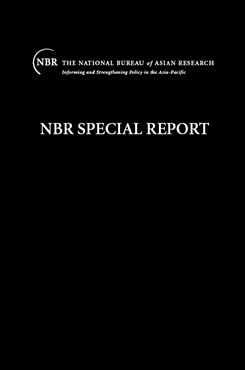NBR Special Report no. 10
Standards of Power?
Technology, Institutions, and Politics in the Development of China's National Standards Strategy
This timely report co-authored by Dr. Richard P. Suttmeier (University of Oregon), Yao Xiangkui (University of Oregon), and Dr. Alex Tan (Syracuse University) examines both China’s growing interest in high-technology standards and its efforts to craft a national standards strategy, and identifies important implications for international cooperation with China on standards.
EXECUTIVE SUMMARY
MAIN ARGUMENT
China’s interest in promoting its own high-technology standards must be seen in the context of an ambitious policy for technological development that is intended to make China a world leader in science and technology—and standard-setting—by 2020. An examination of six of the more prominent cases of standards development, however, indicates that the motivations for standards development, the actors involved, the nature of international participation, and the various roles played by the Chinese state are by no means homogenous. Despite the techno-nationalist overtones of the current technology policy, Chinese firms and government agencies are pursuing multiple paths to standardization in ways that reflect the growing influences of techno-globalism.
POLICY IMPLICATIONS
- Given its size, global economic importance, and growing technological sophistication, China understandably wishes to play an increasingly important role in setting global standards. The issues for the international community do not concern whether China has a standards strategy or whether activism in standardization will continue; rather, questions concerning the content of the strategy and the forms the activism will take are now the most pressing issues.
- The broad objectives for international cooperation with China on standards should be to reinforce the internationalist and techno-globalist orientations in the Chinese system, including market-oriented approaches to standards. This collaboration will require detailed knowledge of the technological trends in China affecting standards development, the economic prospects for standards initiatives, and, in particular, knowledge of key players and their interests in these initiatives.
- Though China needs to check the influence of narrow techno-nationalist sentiments on expanding Chinese standards initiatives, the international community in turn must not only show a sensitivity to Chinese concerns over the distributive consequences and procedural fairness of global standards practices but also be willing to accommodate the views of this new member of the standards community.
- Policies toward China that fail to recognize the highly variegated landscape of Chinese technological capabilities, China’s economic and political interests in standards, and the strengths and weaknesses of China’s policymaking system are bound to be counterproductive. Such policies will likely both strengthen the hands of China’s techno-nationalists and lead to a number of missed opportunities to work with China on the promotion of technical standards that serve the interest of common technological progress and economic growth.


